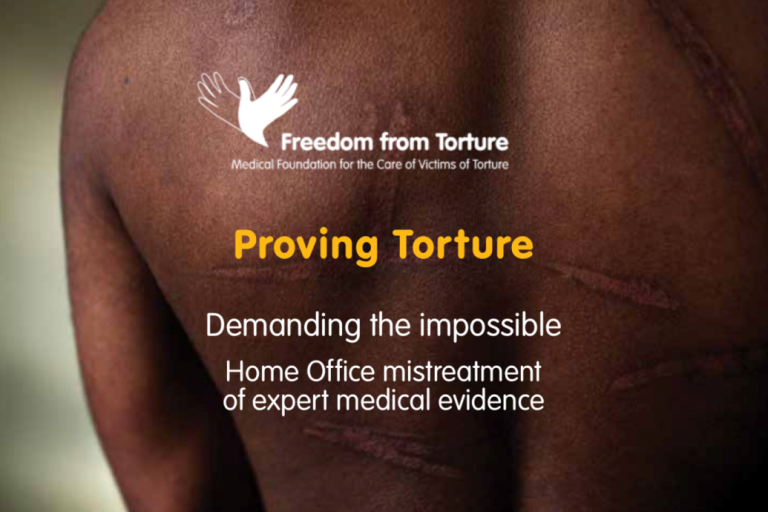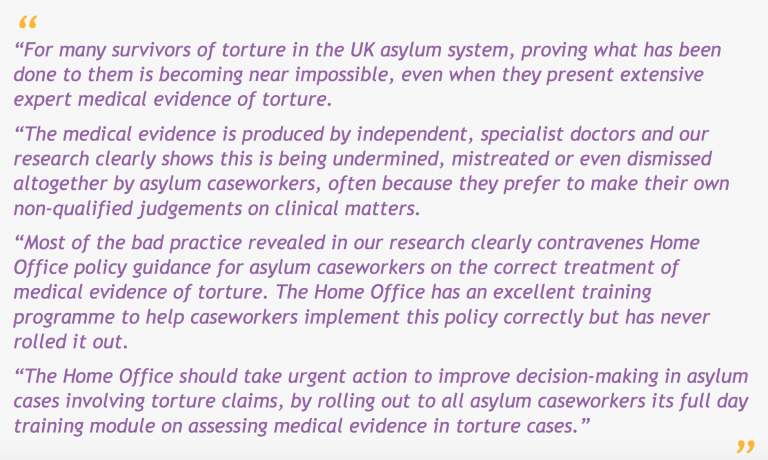Care vs Control: the need for greater support for Home Office asylum caseworkers
This blog was written by Hannah Ellis, a student on the intercalated BSc in Global Health at HCRI
As part of my intercalation in Global Health I chose to write my dissertation on the ethical issues raised by the involvement of medical expert witnesses working with victims of torture seeking asylum in the United Kingdom. Choosing this topic was prompted by the realisation that there was a complete lack of literature on issues raised by the use of medico-legal reports (MLRs) provided by doctors in the UK compared to the wealth of literature existing on France. Furthermore, the ever-present news headlines about conflict and forced displacement alongside persisting negative attitudes towards migrants that exist widely in the UK (Migration Observatory, 2016) meant this was a topic worthy of investigation. The context of a climate of suspicion and so called ‘hostile environment’ towards migrants has led to increased demands for evidence to support asylum applications. This includes evidence of torture provided by doctors that volunteer as medical expert witnesses as the distrust of migrants has meant their bodies must prove what their words no longer can. The necessity of MLRs for asylum seekers to navigate the asylum system in the UK shows how governments are exercising much more control than care regarding these vulnerable people.
Having explored the ethical issues that MLRs themselves present, drawing from writings by authors such as Didier Fassin and Miriam Ticktin, it became clear that many of the issues in France were also present in the UK when I used a report by the UK based charity Freedom from Torture as a case study (Freedom from Torture, 2016a). My critical analysis revealed how significant breaches of ethical principles – such as autonomy and justice – were occurring due to the mishandling of MLRs by Home Office caseworkers.
Ultimately, this led to an overreliance on judges to overrule decisions. The report revealed that 76% of appeal cases involving MLRs were granted, significantly greater than the UK average of 30% (Freedom from Torture, 2016a). My analysis discussed how the cause of mishandlings may be rooted in negative attitudes held by caseworkers influenced by the current climate surrounding immigration and further exacerbated by a lack of adequate support from the Home Office. This was highlighted by the report that revealed a training programme had been designed but never implemented. Having reflected on the analysis I conducted it could be argued that caseworkers were set up to be seen as the ‘bad guys’ of the asylum system with committed volunteer doctors having their hard work disregarded in order for quick decisions to be made. The Freedom from Torture report, by my reading, seemed to frame caseworkers as showing little regard for the suffering of refugees as they substituted their own opinions for that of doctors or did not fully consider medical evidence.
However, since submitting my dissertation, my perspective has changed somewhat. Both a Guardian series (Anon, 2017) and an article written by Home Office whistle-blowers (Lyons, Brewer 2018) expressed a side to the situation I had not considered. I have come to see how the actions of caseworkers that I assumed to be heartless, snap decisions are much more the result of a government system driven by targets than individuals’ attitudes towards asylum seekers.
The first article, written by an anonymous caseworker, described how the current asylum system was “failing people in their darkest hour” (Anon, 2017). The author reflected that this had come about as a culture of meeting targets had taken over from a focus on making the right decision. To meet the required number of final decisions made, caseworkers were having to forego making referrals and giving adequate time to assessing reports as this “extra” work was not credited in the required targets, falling short of which held the “ultimate threat of dismissal” (Anon, 2017). The author seemed distressed by this. It became increasingly difficult to know if they were making correct decisions as they did not have enough time to carry out what they felt to be adequate checks such as assessing medical evidence properly. Ultimately, due to cuts to funding and staff, meeting targets meant losing sight of the care asylum seekers needed and the human cost that rushed decisions could result in.
The second article I came across was by whistle-blowers who previously worked for the Home Office (Lyons, Brewer 2018). When first reading the article, I thought my ideas about the attitudes of caseworkers being to blame for mishandlings of medical evidence were going to be confirmed. The authors wrote how “the asylum system was in effect a lottery depending on the personal views of the decision maker who picked up the file”. They recalled fellow workers making crude, flippant comments about asylum seekers, often mocking their stories or medical photographs, and how a culture of scepticism was encouraged. They revealed how “cut and paste decisions” were made if similar cases to those previously seen came up, without thorough assessment of individual situations (Lyons, Brewer 2018). However, the article also discussed how these “cut and paste decisions” were not entirely due to negative attitudes, rather they are a corner that caseworkers are forced into. Yes, decisions were sometimes influenced by individual attitudes, however, the authors described how mostly they were prevented from doing their job the way they wanted by time pressures and targets. They were required to do 225 reports a year and collectively had a backlog of 50,000 cases to contend with. Government cuts had left the system struggling and the only way to cope seemed to be rushed decisions and stock paragraphs in order to shift the workload. The authors also wrote how rates of burnout and staff turnover were high. From this it is clear that currently the Home Office is not providing suitable support to its staff to make decisions that could mean life or death for those seeking safety in the UK.
Without an alternative to the MLRs that doctors at charities like Freedom from Torture provide, significant changes to the asylum system must be pushed for. In order to help those who have experienced unimaginable suffering in their home countries, staff responsible for granting their protection need to be adequately trained and supported to make correct decisions. The conclusion of my dissertation still stands that this means implementing training programmes for caseworkers, as called for by the Freedom from Torture report. This may help to challenge the attitudes held by some caseworks, however, will not solve the problem entirely. Rather than being focused on targets and stricter policies, governments need to shift the way they operate towards the care end of the spectrum rather than control where displaced people are concerned. This may mean reducing caseloads for individual caseworkers or increasing staff to ensure thorough and respectful assessment of applications is possible. This will take serious negotiation given the current strain on resources. However, I believe that this must be pushed for as it is vital to ensure that these vulnerable people are protected and those that want to do their job in the best interest of their fellow humans, can.
References
Anon. (2017). I worry asylum caseworkers are failing people in their darkest hour. [online] The Guardian. Available at: https://www.theguardian.com/public-leaders-network/2017/apr/08/asylum-caseworkers-home-office-cuts-syria-war [Accessed 7 Jun. 2018].
Freedom from Torture. (2016a). Proving Torture. [online] Available at: https://www.freedomfromtorture.org/proving_torture [Accessed 16 Feb. 2018].
Freedom from Torture. (2016b). Proving Torture – Report Summary [online]. Available at: https://www.freedomfromtorture.org/sites/default/files/documents/proving_torture_summary_withfc_full_final.pdf [Accessed 28 Mar. 2018].
Freedom from Torture. (2016c). Home Office mistreatment of medical evidence of torture must end. [online] Available at: https://www.freedomfromtorture.org/news-blogs/21_11_2016/home_office_mistreatment_of_medical_evidence_of_torture_must_end [Accessed 28 Mar. 2018].
Lyons, K. and Brewer, K. (2018). ‘A lottery’: asylum system is unjust, say Home Office whistleblowers. [online] The Guardian. Available at: https://www.theguardian.com/uk-news/2018/feb/11/lottery-asylum-system-unjust-home-office-whistleblowers [Accessed 7 Jun. 2018].
Migration Observatory. (2016). UK Public Opinion toward Immigration: Overall Attitudes and Level of Concern. [online] Available at: http://www.migrationobservatory.ox.ac.uk/resources/briefings/uk-public-opinion-toward-immigration-overall-attitudes-and-level-of-concern/ [Accessed 9 Mar. 2018].




0 Comments